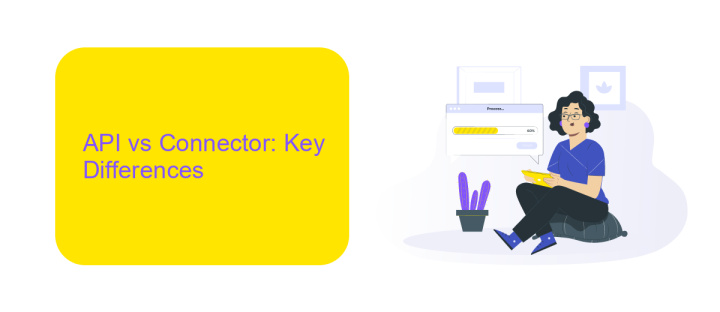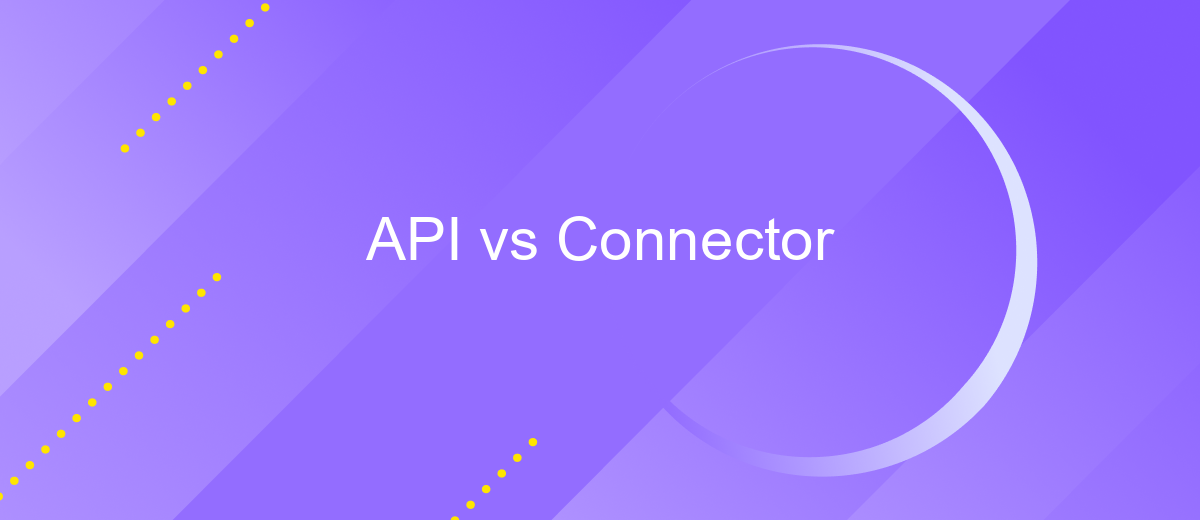API vs Connector
In the rapidly evolving landscape of digital integration, understanding the differences between APIs and connectors is crucial for businesses aiming to streamline operations and enhance connectivity. APIs, or Application Programming Interfaces, provide a set of rules and protocols for building software applications, enabling seamless communication between different systems. Connectors, on the other hand, serve as pre-built solutions that facilitate integration without extensive coding, offering a more user-friendly approach to linking disparate platforms.
Introduction
In the rapidly evolving landscape of technology, the terms API and Connector frequently surface, often leading to confusion among developers and businesses alike. Both serve as pivotal components in the integration of software systems, yet they function in distinct ways. Understanding the differences between APIs and Connectors is crucial for making informed decisions when designing or implementing a system. This exploration aims to clarify the roles, benefits, and limitations of each, providing a comprehensive overview for anyone involved in software development or IT management.
- API (Application Programming Interface): A set of rules and protocols for building and interacting with software applications.
- Connector: A tool or mechanism designed to facilitate communication between disparate systems or applications.
- Integration: The process of bringing together different subsystems to function as a cohesive unit.
By examining the fundamental characteristics of APIs and Connectors, we can better appreciate their respective strengths and weaknesses. APIs offer flexibility and control, enabling custom solutions tailored to specific needs. Connectors, on the other hand, provide ready-made solutions that simplify integration tasks, often requiring less technical expertise. Ultimately, the choice between using an API or a Connector depends on the specific requirements and goals of your project.
API vs Connector: Key Differences

APIs and connectors serve distinct roles in the realm of software integration, each with unique functionalities and applications. APIs, or Application Programming Interfaces, are sets of protocols and tools that allow different software applications to communicate with each other. They provide a standardized way for developers to access the features or data of an application, enabling seamless integration and interaction between disparate systems. APIs are crucial for enabling real-time data exchange and are often used in complex integrations where custom functionality is required.
Connectors, on the other hand, are pre-built solutions designed to facilitate integration between two specific applications. They simplify the integration process by providing a ready-to-use interface that requires minimal configuration. Unlike APIs, connectors do not require in-depth programming knowledge, making them accessible to non-developers. Services like ApiX-Drive exemplify the ease of using connectors by offering a platform that automates the integration process, allowing businesses to streamline their workflows without extensive technical expertise. While APIs offer flexibility and customization, connectors provide a user-friendly approach to achieving integration goals efficiently.
Benefits of Using APIs

APIs, or Application Programming Interfaces, have become an essential component in modern software development, offering numerous advantages for developers and businesses alike. By enabling seamless interaction between different software applications, APIs facilitate the integration of diverse systems, enhancing functionality and user experience. This capability is crucial in today's interconnected digital landscape, where the ability to communicate and share data across platforms is a significant competitive advantage.
- Efficiency: APIs streamline processes by allowing developers to leverage existing functionalities, reducing the need to build features from scratch.
- Scalability: APIs support the growth of applications by enabling easy integration of new features and services, allowing businesses to scale effortlessly.
- Innovation: By providing access to third-party services and data, APIs foster innovation, enabling developers to create more robust and versatile applications.
- Flexibility: APIs offer flexibility in choosing the best tools and services for specific tasks, resulting in more tailored and effective solutions.
- Cost-effectiveness: Utilizing APIs can significantly reduce development costs, as they minimize the time and resources needed to implement new functionalities.
In conclusion, the adoption of APIs offers a strategic advantage for businesses seeking to enhance their technological capabilities. By promoting efficiency, scalability, and innovation, APIs not only improve the quality of software applications but also enable organizations to respond swiftly to market demands. As such, they are a vital tool in the arsenal of any forward-thinking enterprise.
Benefits of Using Connectors

Connectors serve as a crucial link between disparate systems, allowing for seamless data exchange and integration. Unlike APIs, which require custom coding and development, connectors offer a more straightforward and often no-code solution. This ease of use makes connectors particularly appealing to businesses looking to streamline operations without the need for extensive technical expertise.
One of the primary advantages of using connectors is their ability to accelerate integration processes. By providing pre-built solutions, connectors eliminate much of the time-consuming setup associated with traditional API integrations. This efficiency not only speeds up deployment but also reduces costs, enabling companies to allocate resources more effectively.
- Reduced development time and costs
- Enhanced data synchronization between platforms
- Increased scalability and flexibility
- Improved user experience with simplified interfaces
In addition, connectors often come with built-in security features, ensuring that data transfers are protected against unauthorized access. This added layer of security is vital for businesses handling sensitive information. Overall, connectors provide a user-friendly, efficient, and secure means of linking systems, making them an invaluable tool in modern digital ecosystems.
- Automate the work of an online store or landing
- Empower through integration
- Don't spend money on programmers and integrators
- Save time by automating routine tasks
Conclusion
In the rapidly evolving digital landscape, the choice between API and Connector solutions plays a crucial role in determining the efficiency and scalability of integrations. APIs offer unparalleled flexibility and control, allowing developers to tailor integrations to specific needs with precision. However, they require technical expertise and can be resource-intensive to implement and maintain. On the other hand, Connectors provide a more user-friendly approach, enabling businesses to quickly establish integrations without deep technical knowledge. This ease of use makes Connectors an attractive option for companies looking to streamline processes without significant investment in development resources.
Ultimately, the decision between APIs and Connectors depends on the specific requirements and capabilities of the organization. For businesses seeking a balance between customization and simplicity, platforms like ApiX-Drive offer a compelling solution. ApiX-Drive enables seamless integration across various applications, providing both the flexibility of APIs and the accessibility of Connectors. By leveraging such platforms, companies can enhance operational efficiency and foster innovation, adapting swiftly to the ever-changing demands of the digital world.
FAQ
What is the difference between an API and a connector?
Why would I use a connector instead of directly integrating through an API?
Can connectors work without APIs?
Is it possible to customize integrations when using a connector?
How can I ensure data security when using connectors?
Apix-Drive is a simple and efficient system connector that will help you automate routine tasks and optimize business processes. You can save time and money, direct these resources to more important purposes. Test ApiX-Drive and make sure that this tool will relieve your employees and after 5 minutes of settings your business will start working faster.


